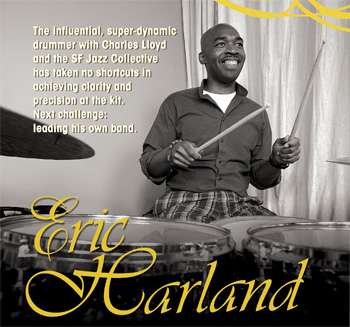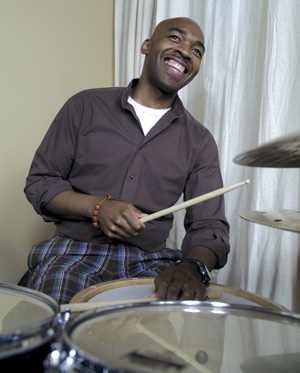Eric Harland:<br> Always Ready To Receive The Muse

by Michael Parillo
In our November feature, Harland enlightens us to all sorts of technical matters, including achieving precise strokes on drums and cymbals, conserving energy, and strengthening the weaker hand and foot. Here’s more of our conversation. We kick off by discussing a spirited New York City performance last spring by the trio behind saxophonist Charles Lloyd’s East-meets-West Sangam album.
Sangam
MD: Let’s talk about the Sangam trio with Charles Lloyd and Zakir Hussain. When I saw you at Carnegie Hall, it was stunning how you started at the drums and Lloyd at the piano but you two switched instruments before you played a note, all while Zakir was singing rather than playing tabla.
Eric: In Sangam, everything is improv. When the group started, Charles just wanted to get me and Zakir on the same stage. We were in soundcheck, and Charles said, “Eric is going to sit at the piano…” I was like, Huh? Basically Charles just wanted this introductory vibe because he’s all into being meditative and bringing this Zen moment in. Advertisement
It was nice that he was able to pull me out of being ready to just go into drum mode. That’s very significant for the group because knowing that I have to play piano first changes my whole perception when I go play drums. If playing drums was all I was thinking about, it would probably be a completely different show. Even for Zakir–he’s not just coming out and playing tabla; he has to sing. So we’re completely uncomfortable with what we’re about to do. I’m sitting there trying to act like a piano player. Carnegie Hall was really neat because there were so many piano players in the audience that night.
MD: Plus it’s Carnegie Hall.
Eric: Yes. I was thinking, There are unbelievable piano players in New York that haven’t played Carnegie Hall, and here I am about to play. I felt so intimidated. But instead of feeling nervous and fearful, I decided to just try to show what the piano is to me. And Carnegie Hall was one of the first times I was able to do that.
Most of the time I go inside and [play] the strings, but they had the top down, so they just cut off that whole thing. I could only tamper with the strings in the first register. The way a piano is broken down, the best part is deep within. The first register is all tinkly stuff. So I had these Indian bells, and I put them in there [and played the strings] and it was really great. It helped me feel confident, and I was able to keep the rhythm thing going. Because with Zakir, he’ll stay on the groove for a second, but then he’ll throw something at you and you’ll be like, “I don’t play piano, so I might get off–I am not going to lie.” Advertisement
MD: So that’s a typical way that you start your shows?
 Eric: Now that’s the way we start shows all the time. It helps just simmer everything down. It helps the audience–their expectations come down because immediately they think, How is this going to come together?
Eric: Now that’s the way we start shows all the time. It helps just simmer everything down. It helps the audience–their expectations come down because immediately they think, How is this going to come together?
A lot of great musicians always say the best thing is the beginning and end of a tune. You can take someone doing a great tune, but if they end all messed up, then you’re kind of sitting there, and you don’t know when to clap.
MD: It just peters out.
Eric: Yeah. Zakir always knows how to finish. That kind of drama is great. He knows how to take charge, and that’s what he’s been teaching me, because I just kind of swim in the water. If everybody’s swimming, I’m swimming. The problem with that sometimes is that you can be swimming forever. Sometimes someone has to step up and say, “Okay, that’s enough in the pool–let’s go get on land.” If you’re constructing a concert, that’s what people need. At least that’s what we think people need. It works. Advertisement
MD: There are some moments on the Sangam album where it feels like you guys hit the end together, but it’s by the seat of your pants. It’s not like, “This is how we’re going to end, fellas.”
Eric: That’s the thing. It feels like I’m on the seat of my pants because I’m definitely on the seat of my pants. But Zakir is just such a master of rhythm, and he has a lot of trust with me somehow. So he’ll have these different kind of tals [rhythmic cycles] that would end on just the most random spot that you could ever think of. Even if you’re playing in four, it might end on the third 16th of the third beat. You’re like, Is he really putting that there? And then you kind of figure it out.
MD: So you hear it and then you know it.
Eric: Yeah. You have to catch on quick. I love being around great musicians that challenge me. Somehow I got this label of being a drummer who can play all different meters and all different kinds of this and that, so I’m always thrown into these kinds of situations. And it’s great. It just makes me better and better because I never want to let anybody down. Advertisement


